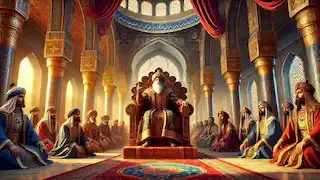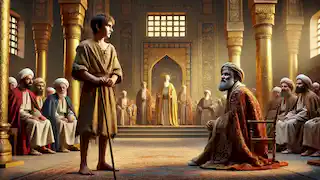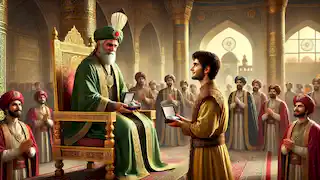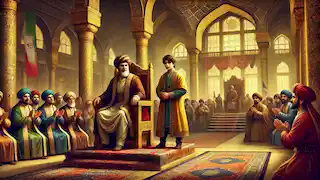The Story of the King’s Challenge
Reading time: 8 min

About this story: The Story of the King’s Challenge is a Legend from Iran set in the Ancient This Dramatic tale explores themes of Wisdom and is suitable for All Ages. It offers insights. A shepherd’s loyalty unearths the hidden treasure within a king’s riddle.
In the heart of ancient Persia, nestled between the high mountains and vast deserts, there once ruled a wise and powerful king named Shahrokh. Known for his intelligence and charisma, he was beloved by his people but feared by his enemies. Shahrokh had brought peace and prosperity to his kingdom, expanding its borders through wisdom rather than war. Yet, in the depths of his heart, there was an unquenchable curiosity about the limits of human wisdom and virtue. This curiosity often led him to test his own understanding, as well as that of his subjects.
One day, Shahrokh called together the brightest minds of his court: scholars, poets, mathematicians, and philosophers. In their company, he announced a grand challenge, something that would test not only the knowledge but the integrity and wit of anyone daring to participate. The challenge was simple in design but extraordinary in scope.
“Anyone who can answer my riddle and bring me a solution to this question will be granted their heart’s deepest desire,” Shahrokh declared. “But beware, for any who fail will be sentenced to exile from this kingdom, never to return.”
The challenge attracted the attention of the entire kingdom, and soon, word spread far beyond Persia’s borders. Travelers from distant lands arrived at the gates of Shahrokh’s palace, each hoping to solve the mystery and earn their reward. Little did they know that the king’s riddle would push them to the very edge of their wits and that Shahrokh had woven within it layers of meaning, each deeper than the last.
The riddle went as follows: “A king once had three sons, each as wise and noble as the last. He loved them equally, and so he promised his kingdom to the one who could bring him the most precious treasure in all the land. However, this treasure cannot be found, bought, or sold. It can only be given willingly. What is it?”
With his riddle set forth, Shahrokh leaned back upon his throne, his eyes gleaming with anticipation. The palace became a hive of whispers, as each person sought to understand the meaning behind the king’s words.
The Arrival of the Wise Men and the Foolish Alike

In the days that followed, a steady stream of challengers presented themselves before Shahrokh. First came a wealthy merchant who offered rare gems and golden artifacts from far-off lands. The merchant’s riches sparkled in the sun, casting a warm glow across the throne room, but Shahrokh shook his head and dismissed him.
“The riddle’s solution lies not in wealth,” he said simply.
Next came a famous poet who recited verses about love, honor, and the fleeting nature of life. His words were beautiful, capturing the essence of human experience, but Shahrokh only smiled and shook his head again.
“Words may be immortal, but they are not the answer I seek,” he replied.
Days turned into weeks, and the challengers continued to arrive. Some brought objects they considered sacred, such as family heirlooms or ancient relics. Others spoke of ideals like peace, love, and faith, but none could truly capture the essence of the treasure Shahrokh sought. Many were puzzled; others were frustrated, yet the king’s mystery remained unsolved.
Amid the procession of would-be victors, there appeared a young man named Arash. Unlike the other challengers, he was neither wealthy nor famed. Arash was a simple shepherd from a nearby village, a man of modest means but with a mind sharp and curious. Arash approached the throne with nothing in his hands, only a calm expression upon his face.
The courtiers murmured in surprise. What could this humble shepherd hope to offer that the wealthiest and wisest of the land had failed to provide? Arash, however, stood his ground, his gaze meeting that of the king.
“Sire,” Arash said, bowing respectfully, “I have come with an answer to your riddle, but I carry nothing with me, for the treasure you seek is invisible. It is trust.”
The Test of Trust
A hush fell over the throne room as Arash’s words echoed against the high stone walls. Shahrokh leaned forward, studying the young man before him. “Trust, you say?” the king murmured thoughtfully. “And how, young shepherd, do you propose to demonstrate this trust?”
Arash’s face remained calm, though a glimmer of anticipation sparkled in his eyes. “I shall put myself in your service for one year,” he said. “In that time, I will act as your most loyal subject, with no expectation of reward or recognition. If I am successful in gaining your trust by the end of that year, then I ask you to consider my answer as worthy of your challenge.”
Intrigued, Shahrokh agreed to Arash’s proposal. “But remember,” the king cautioned, “trust is earned, not freely given. Your year of service will be marked by trials to test your sincerity and virtue.”
And so, Arash began his year at the royal court, performing tasks both menial and arduous. Shahrokh’s advisors watched him closely, noting his every move and interaction. They gave him no favors, no signs of encouragement, but Arash remained steadfast. He was diligent and humble, never seeking praise for his work.
Months passed, and Arash’s reputation began to grow. Word spread among the courtiers of the shepherd’s dedication, and slowly but surely, even the most skeptical advisors began to believe in his sincerity. However, the king himself remained guarded, still wary of placing his trust in anyone too quickly.
The Final Trial

As the year drew to a close, Shahrokh prepared one last test for Arash, a challenge that would reveal the true nature of his intentions. The king summoned Arash to his chambers and presented him with a delicate silver box, its surface engraved with intricate patterns.
“Inside this box is a map,” Shahrokh explained. “It is the map to a hidden valley where the ancient treasures of my ancestors lie buried. Take it and guard it well. I ask you to deliver this map to my cousin, who lives in the distant city of Sari. It is a journey that will test your endurance and resolve.”
Arash accepted the box without question, bowing deeply before setting off on his journey. The road to Sari was treacherous, lined with bandits and wild animals, but Arash traveled with caution and determination. He avoided unnecessary risks and kept the silver box close, trusting in the king’s wisdom to guide him.
After weeks of arduous travel, Arash arrived in Sari, where he met the king’s cousin. He handed over the box as instructed, feeling a sense of relief and accomplishment. However, as soon as the box left his hands, Arash felt a wave of unease. He had completed the task, but something within him sensed that his journey was far from over.
The Revelation
Returning to the palace, Arash was surprised to find Shahrokh waiting for him in the throne room. The king’s expression was unreadable as he beckoned Arash to approach.
“Did you deliver the box?” Shahrokh asked, his voice as calm as ever.
“Yes, my lord,” Arash replied, bowing deeply. “The box is safe with your cousin.”
At that moment, Shahrokh’s stern expression softened, and he rose from his throne. “The box you carried was empty, Arash. There was no map, no treasure, only the weight of my trust in your hands. By completing this journey without question, you have proven that you value honor and duty over material gain.”
The courtiers gasped in astonishment, realizing the depth of the king’s test. Arash stood in silence, his face a mixture of surprise and humility.
“You have shown that the greatest treasure of all is trust,” Shahrokh proclaimed. “You are indeed worthy of your reward.”
A New Beginning

With the challenge completed, Shahrokh invited Arash to join his court as an advisor, offering him a position of great honor and respect. Arash accepted, but his life in the palace did not change him. He remained as humble and devoted as ever, earning the admiration of everyone in the kingdom.
In time, Shahrokh’s challenge became a legendary tale, told from village to village, across the deserts and mountains of Persia. People spoke of the shepherd who had earned the king’s trust and the great wisdom of Shahrokh’s challenge, which taught them that true wealth lies not in gold or jewels but in the bonds that hold people together.
And so, the legacy of Shahrokh’s riddle and Arash’s courage endured, reminding each generation that the most precious treasures are those that cannot be seen or touched but only felt within the heart.

In the end, Shahrokh’s kingdom flourished, guided by wisdom and trust, and the story of the king’s challenge was passed down through the ages, a timeless testament to the virtues that unite humanity across all lands.


















